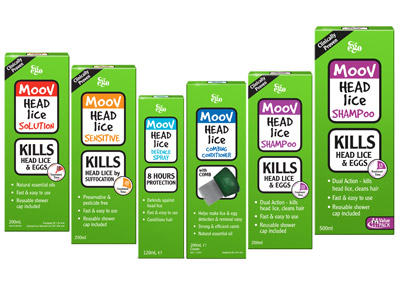Dr Kerryn Grieve MOOV Head Lice Survey Interview

Dr Kerryn Grieve MOOV Head Lice Survey Interview
Head lice are more prevalent than many Australian parents are lead to believe. It is no surprise then, that the start of a new school year makes mums and dads anxious of the dreaded -itch'. The MOOV Head Lice Survey conducted in partnership with Galaxy Research, surveyed over 1,000 mums (with children aged between 4-12 years old) revealing that over half (57%) of mothers admit that they aren't comfortable talking about their child's head lice to their school or other mums and dads. This figure, when coupled with the number of cases in Australia, shows that we need to do something to reduce the stigma, dispel the myths and get parents talking about head lice.
MOOV can also reveal that 72% of mums struggled to break the head lice cycle with their children and felt their school had a chronic or continual issue with head lice infestation. The larger issue is that nearly half (48%) of parents also admit that they don't always tell their school when their child has head lice further perpetuating both lice and the associated stigma. This means it's very possible schools are under-estimating the problem and the lack of communication from parents may potentially compound the issue.
The MOOV Head Lice Survey, the first of its type in Australia, focuses on the psychological effects of diagnosis on children and parents, rather than just solely on prevention and treatment. Armed with this new evidence into the habits and behaviours of Australian families, MOOV gives parents effective tools to fight head lice in schools. During the first school term of 2013 MOOV will be running an education program for over 150,000 primary schools students called -Defend Your Class'. The program, developed in conjunction with teachers, will help reduce the stigma of head lice amongst both kids and parents, removing the -embarrassment factor' by encouraging open communication and better lice management practices.
Renee Mill, respected psychologist and parenting expert explains how parents can help do more; 'over half (51%) of Australian mums believe there has been some type of short-term psychological impact on their child as a result of their head lice diagnosis. This in itself is quite astounding and stems from the misconceptions attached to lice, making dealing with the issue more complicated."
'Parents' opinions and reactions influence that of their children. Those who overreact will have children who automatically believe something awful or bad is happening, which will further exacerbate the stigma. It's important to reassure your children that at some point most people will get head lice, and that it's not a big issue."
MOOV ambassador Nicole Livingstone, former Olympic swimmer and busy mum of three (to Ella, Joshua and Robinson) is happy to admit to her children's Head Lice in the past.
'Having children with head lice can be a real challenge. Not only do you have to inspect the whole family to check for lice and eggs but you also have to deal with the tears and distress that so many children experience when they find they're hosting a -surprise party'!
Like most parents, our family life is busy enough without bringing head lice into the equation. This is why I'm a big fan of MOOV's Back to School programme as it's a practical look at Head Lice for both parents and kids. The MOOV research shows just how prevalent head lice are amongst kids and highlights the need for parents to openly talk about the problem to reduce the stigma. The reality is it's a common problem that needs to be addressed." says Nicole.
MOOV Head Lice products are effective in destroying, detaching and defending against head lice, the MOOV range consists of: MOOV Head Lice Combing Conditioner, MOOV Head Lice Defence Spray, MOOV Head Lice Sensitive, MOOV Head Lice Shampoo, and MOOV Head Lice Solution.
Visit www.moov.com.au to learn more about MOOV Head Lice products to destroy, detach and defend against head lice.

Interview with Dr Kerryn Grieve
Question: Were you surprised by any of the findings in the MOOV Head Lice Survey?
Dr Kerryn Grieve: We knew there was a stigma surrounding head lice but the sheer scale of it did shock us, 4.5 million cases every year is huge. Also the fact that a third of Australian children are getting up to five infestations, per year is particularly shocking. Head lice is common but we didn't realise that parents were embarrassed when there kid got head lice and quietly treated it and didn't want to tell the school or other mums; which is very unfortunate because it's only through communication that we can actually manage the head lice situation.
Question: How can we help break down the stigma associated with head lice?
Dr Kerryn Grieve: With education, we have to start talking openly about what head lice is and what it means. There is still the belief that if my child has head lice the other mums will think that I'm a bad mum or my kid has dirty hair or I don't look after my children. We need to get the truths out there and the truth is that head lice is like you and me and likes a clean environment; if your child has head lice it doesn't mean they are dirty and it doesn't mean you aren't looking after them, it means they have good, healthy hair which is what lice look for.
We've also got to remind parents that the way children react when we talk about head lice is learned behaviour from their mums and dads. If mum and dad find a head lice infestation and get all icky about it and tell their children not to tell anyone then the kids get worried and embarrassed about head lice and bullying may occur at school.
It's all about education and that is what we're trying to do with the 2013 MOOV -Defend Your Class' program. We are trying to get the information into the schools and present head lice to children, in a fun way with a game to break down some of the fear.
Question: Can you talk about the short term psychological issues associated with children being diagnosed with head lice?
Dr Kerryn Grieve: Half of the parents surveyed believed the children had a negative psychological reaction to a head lice diagnoses and you can see this when a third of them visibly break down in some way and become stressed. Again, I think that comes back to what the children are learning from the parents, if the parents make a big deal of it then the children think there is something wrong and we know that the psychological distress is very real especially because the parents and schools make a fuss about head lice and then fellow students may pick on children somewhat with head lice.
We want to turn it around and make the parents recognise that head lice is a fact of life and there are ways to treat it properly, as a community. If one child in the classroom is identified as having head lice and then all the parents in the class are warned, asap, they all treat asap then we are going to be able to get rid of head lice in that classroom. It can be a problem when most parents are on top of the treatment and are very diligent but one or two parents don't know their child has head lice or doesn't treat their child for head lice and then parents can diligently treat their child but then put them back into an infested classroom. It is the communication that is the key here, act quickly with the other parents and the school and treat the infestation as a school community.
Question: How can a parent prevent their child getting head lice?
Dr Kerryn Grieve: There are some fabulous head lice defence products such as the MOOV Head Lice Defence Spray which makes the hair unattractive to lice, lice have to make a decision to transfer from one head to another, they can't fly or jump. The lice only transfer when they're confident that they are going to have a good home, on the new head and the MOOV Head Lice Defence Spray makes the hair unattractive to the lice which discourages them from transferring across. MOOV Head Lice Defence Spray is to be used, every single day, to reduce the chance of a head lice infestation.
Question: What are the number on signs to look for in regards to head lice?
Dr Kerryn Grieve: Itching isn't a good indicator, only a third of all head lice infestations are itchy. A good idea is to get a metal tooth head lice comb and quickly run it through the children's hair, every night, particularly the hair over the ears and behind the neck (because that's where they like to live) and do a quick check every night to see if they've picked up head lice. It's a good idea to have a bottle of MOOV Head Lice Shampoo in the cupboard because if you do find head lice you can treat fast. It's important to let the school know straight away and once you've cleared the infestation keep up the regular checking. It doesn't take a long time to check the hair every night but it allows you to act as soon as you detect an infestation you can treat, immediately.
If one member of the family is found to have head lice then you need to check everybody, dad included. There is nothing worse than if dad picked up the infestation and all the kids are treated and dad may pass it back to the kids if he is left untreated.
Question: What type of hair do head lice, like best?
Dr Kerryn Grieve: Head lice like a nice clean environment and having head lice is not a reflection of dirty hair. A few styling products can help prevent head lice, a bit of hairspray or boys may like to use styling gel as they dirty the hair a little bit which discourages head lice. Tying hair up does help as lice transfers through hair-to-hair contact so if a girl has her hair tied up in pigtails or a ponytail then it's less likely to fall forward and contact with a friends hair which is not tied back.
Question: How come head lice is more common in primary school?
Dr Kerryn Grieve: Head lice are more common in primary school because of the way children interact and you need hair-to-hair contact for the lice to transfer. As adults we generally keep our distance from each other as do older children.
Interview by Brooke Hunter
MORE



